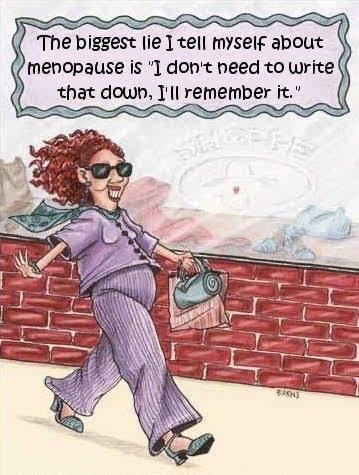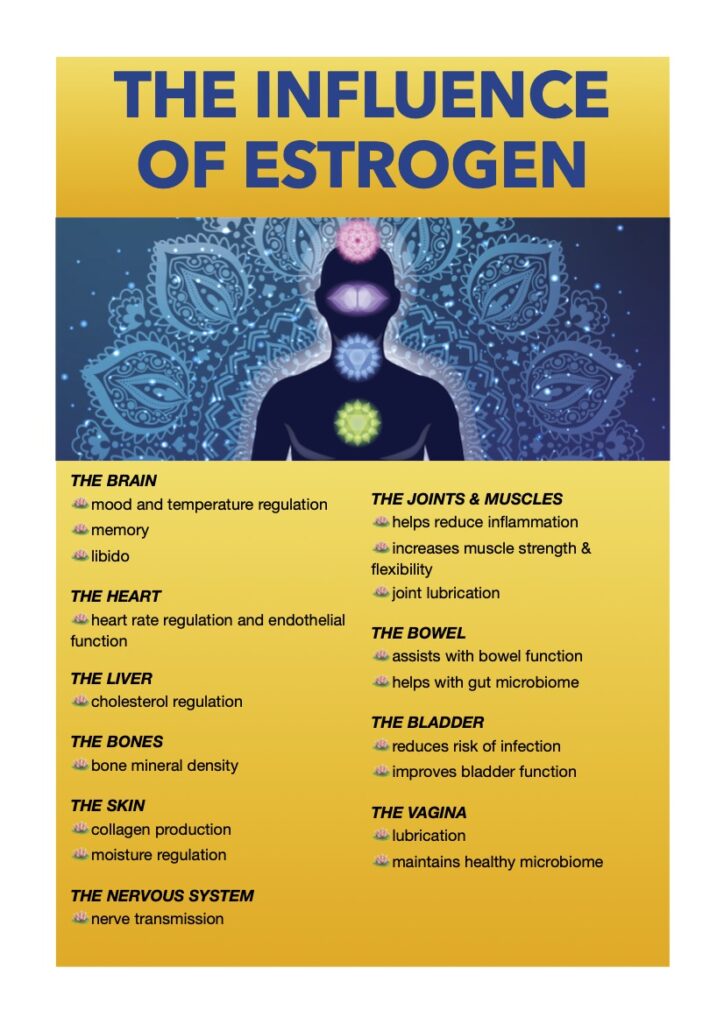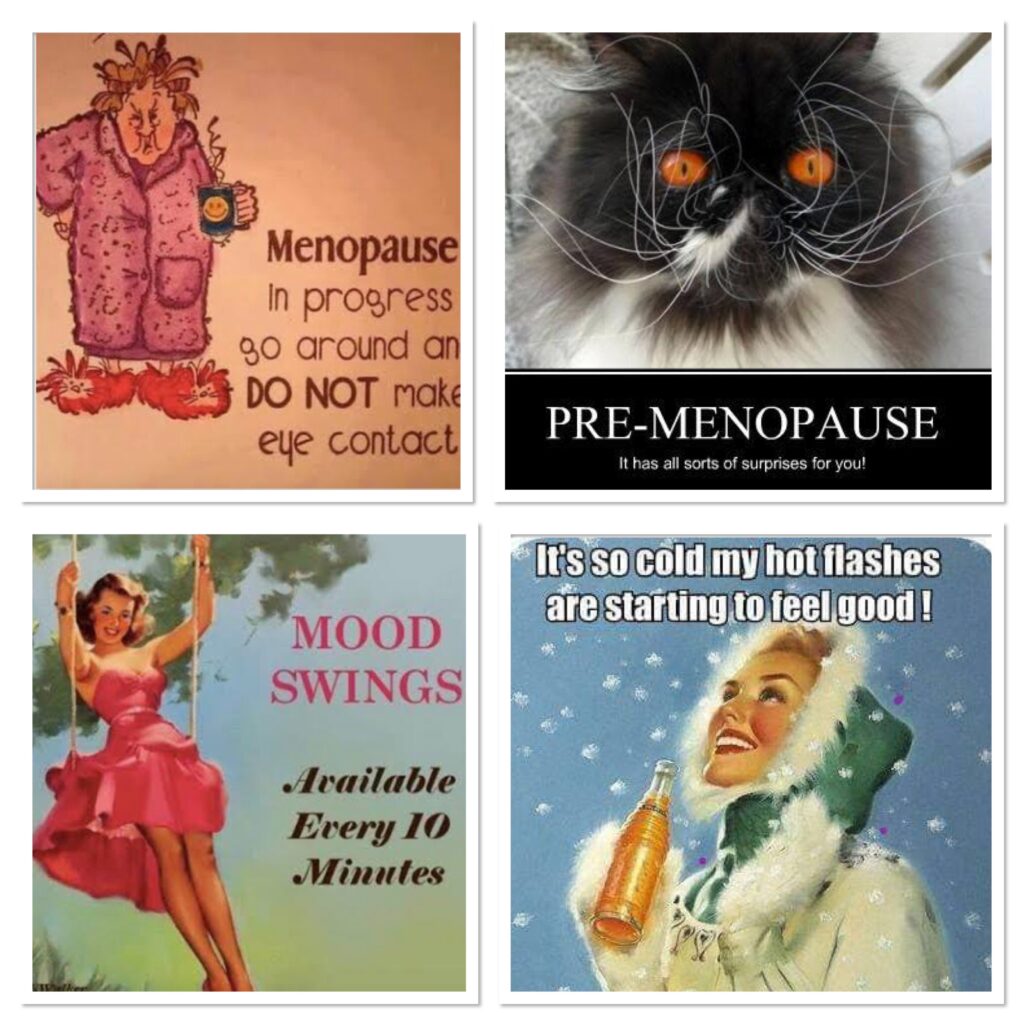Championing “The Menopause” with Yoga therapy… & MHT

“Minutes, not months.” I first heard this Buddhist adage during a meditation with Buddhist monk Ajahn Brahm some 20 years ago. At the time, I remember it struck a deep chord within. I had no idea though, back then, just how much this little piece of ancient Buddhist wisdom would later serve me during one of the most confronting times of my life, “The Menopause.” ‘The’, being an apt precursor to the word/phenomenon that is menopause, as when it strikes, it has the potential to take you down, into its wasteland of darkness and disarray, all else falling to insignificance in its shadow.
So what exactly is The Menopause?

It is many things to many women. What I can confidently say though is – having now worked with countless menopausal women in a Yoga therapy setting, and having survived thus far my own perimenopausal and postmenopausal symptoms – in the wise words of gangster rapper Fat Joe, “this s#&t is real!” Until you’ve had the pleasure – or in many cases, the displeasure – of experiencing the highs and lows of the wild mistress of menopause yourself, and have lived to tell the tale, it’s hard to comprehend the dark and barren badlands that for many women menopause can be.
For the menopause novices out there, the average age bracket of menopause for a woman is somewhere between 45-55, but it can occur for women much earlier, and indeed much later, depending on lifestyle, genetics, and other health factors. The textbook definition of menopause is “the time of life when a woman’s ovaries stop producing hormones and menstrual periods stop.” The menopause becomes official when a menstrual cycle hasn’t occurred for a period of twelve months in a row. Perimenopause refers to the period (pun intended) leading up to this, and postmenopause refers to the duration from the cessation of the menstrual cycle until the end of life. Both perimenopause and postmenopause can come with an array of disconcerting symptoms, to say the least. Some women (my own mum included), are lucky enough to skip menopausal symptoms altogether.
For me, symptoms included heart and gut distress, brain fog, memory loss, anxiety, bone density loss, and an overall feeling of impending doom. On the worst of days, these symptoms were all consuming and became the main focus of my day to day. Menopause had me by the proverbial balls. There was a point where I had to cancel classes, clients, and I struggled to do the simplest of tasks like pack my daughter’s lunchbox, and drive the car. What was most frustrating was that to my knowledge at the time, I was doing all the “right” things for my mind and body. Alongside trialling a variety of natural menopause remedies, and natural hormone replacement therapy (compounded bio-identical hormone replacement therapy made from yam and other plant based ingredients), I had over 20 years of health and wellness training under my belt, yet still it felt like the rug was being pulled out from underneath me, and everything I knew (or thought I knew) about women’s health was now up for question. That was a hard pill to swallow.

The menopause took me to a dark and scary place. It took its toll one morning, a year or so after the onset of symptoms when my then 11 year old found me unconscious on the bathroom floor. My nervous system had gone into overdrive resulting in a digestive system meltdown and blackout. An unanticipated outcome for someone with a regular yoga and meditation practice, and a clean, healthy diet. But when life gives you lemons you make lemonade, and as a yoga practitioner and practicing Yoga therapist, research and getting to the root cause of things is my area of interest. So, I sought out a team of knowledgeable women’s health and hormone specialists, and after months of exploration and research into this profound change of life, several blood screenings, scans and a variety of tests later, it became more and more evident that my symptoms were the result of very low estrogen levels. At that point, I was aware of the importance of estrogen, but didn’t understand just how much the brain and body relies on it to function. The proverbial penny was beginning to drop, and I was beginning to understand why my regular health and wellness regime was no longer cutting it.
In looking at the science of menopause, and the complex role of estrogen for homeostasis in the female human, we can begin to understand how this very natural phase of life can hugely shake, rattle and roll the lives of so many women. When the ovaries begin to shut shop around the time of menopause, ceasing the production of estrogen, the function of the central nervous system can be greatly impacted resulting in a domino effect of symptoms from neurological disorders, cardiovascular disease, hot flushes and night sweats, insomnia, sexual disfunction, mysterious muscle & joint pain including loss of strength & flexibility, nervous system meltdown, to digestive issues including weight change and irregular bowel.
The bottom line? Estrogen is needed for so much more than simply reproductive system regulation. It is the crucial building block of many organs and systems within the body…

Furthermore, menopausal studies highlight an acceleration in sympathetic nervous system activity…
(SNS = fight or flight response) during the menopausal phase of life.
https://www.news-medical.net/amp/health/How-Does-Menopause-Affect-the-Brain.aspx
https://pubmed.ncbi.nlm.nih.gov/21941208/
This means if we are to avoid the stereotype of the menopausal woman…

….we need to shift gears to instigate more parasympathetic activity (PNS = rest and restore).

So, in the thick of my symptoms, in order to feel my fabulous self again and slow down this very natural decline in hormone production, it was becoming clear that two things needed to happen …
- Replacement of the diminishing estrogen, and,
- Reduction of SNS activity (fight/flight), and an increase in PNS activity (rest/restore)
My body was telling me to change gears from high to low speed. From the macrocosm to the microcosm. From months, to minutes.
Operating in fight or flight much of the time, makes everything feel a whole lot harder than it needs to be. The smallest of challenges can feel overwhelming. So it’s of great value during the menopausal phase to take a “less is more” approach to… well, everything.
At the height of my symptoms, future plans and goals no longer took precedence. What mattered, was getting through one day at a time, one minute at a time. If I was going to get through the inner chaos that I was experiencing, I had no choice but to minimise my to-do lists, and prioritise my well-being and these messages from my heart, gut, brain, and ovaries to SLOW DOWN, and let go of some things.
In this light, menopause is the body’s way of slamming on the brakes and demanding presence, and an awakening of sorts. For me, this involved quite a confronting and uncomfortable process of letting go of some of the ideas I had about western medicine and the prospect of trialling pharmaceutical grade hormone replacement therapy (HRT), more relevantly known in menopause land as menopausal hormone therapy (MHT). I had legitimate reasons for my apprehension around Big Pharma. I had lost trust in western medicine after my daughter became profoundly deaf from the antibiotic Gentamicin, which she was given at birth as a precaution against infection. She was born premature at 32 weeks, and at the time, the hospital had a routine procedure in place to administer Gentamicin to all prem babies without parental acknowledgment. So, for me, putting my ‘faith in the pharmacy’ after that, was tough to say the least. Not to mention the bad rap HRT had following a study (The Women’s Health Initiative – WHI) conducted in the U.S back in the 90’s.
This study involved over 25,000 women, half given hormone therapy and half given placebo. In 2002 reports on the findings of the WHI were released. The findings strongly linked the use of HRT to breast cancer, strokes, and heart disease. This study was later found to be flawed in its design as most of the women were over 60, in an age bracket where the benefits of HRT were minimal and they were more prone to things like cancer, stroke and heart disease.
What helped me get a little more comfortable with trialling pharmaceutical grade MHT was some research my GP shared outlining the pros and cons of taking MHT, in comparison to the myriad of other lifestyle choices we make on a daily basis without a second thought. Lifestyle choices like regular alcohol consumption, overindulgence in rich and refined foods, and a lack of exercise leading to obesity bares a much greater risk of developing breast cancer than 5-10 years of MHT use. Seeing things from this perspective meant that I was better able to weigh things up, and see that for me, the benefits of taking MHT at this stage in my life, outweighed the risks.
“The bottom line is that hormone therapy increases the risk of breast cancer as much as having 2 alcoholic drinks p/day.“
Sonia Davison, Endocrinologist from Monash University’s Women’s Health Research Program
Don’t get me wrong, I’m not by any means endorsing, or recommending all women run out and get themselves a course of GP prescribed MHT. That’s not my area of expertise, nor the ideal. But for me, for now, MHT is a part of my day and serving its purpose in combination with a consistent menopause specific yoga practice, and other natural remedies derived from Indian medicine (Ayurveda), and Naturopathy. This combination of supplementation and yoga therapy has helped me get my life back to a semi-kind of normal.
In retrospect, the new norm of my menopause has gone against my grain in many ways. Moving through the menopause has not been a particularly graceful, or easeful transition for me. For a lot of women during the transition into menopause, the things that put us into hypervigilant / alert / overexertion mode can be too much for the nervous system to handle, and can lead to very quick burnout. For me, having to dramatically change (and in some cases renounce) things that were once a big part of my life has been hard. Coffeeeeeeee for one! At least for a time, some of these things had to go; coffee, alcohol, late nights, certain types of relationships… with people, food and things, and a certain type of health and wellness regime.
Alongside these changes, my yoga practice has transformed to meet my changing needs. I discovered first hand, that some of the yogic practices exacerbate menopausal symptoms, whilst others are a game changer, and can help to ease symptoms in an instant.
So reinventing my daily routine, with less focus on the physical (less dynamic movement based practice), and more focus on the metaphysical (more breath practice, mantra, meditation, and subtle movement) has been an important part of the transition for me.
As for yoga as a stand alone treatment for the symptoms of menopause, if you dig deep enough, it’s not hard to find the myriad of studies out there on yoga’s efficacy as an effective treatment for menopausal symptoms. More recently, a randomised controlled trial on the effects of yoga on menopausal symptoms and sleep quality across menopause statuses referred to on the Jean Hailes website for women’s health by Endocrinologist, Dr Sonia Davison, revealed improvement in menopausal symptoms for both perimenopausal and postmenopausal women…
“Interestingly, the trial revealed improvements in the women’s depression, anxiety and stress scores across all the age groups. There was also an improvement in menopausal symptoms, including hot flushes and sweating for women at the perimenopause and postmenopause stages…
…Clinicians could consider encouraging their patients to try yoga for better sleep.”
Dr Sonia davison
Jean hailes for women’s health
It is heartening to see more and more research being conducted on yoga’s effects on hormone production and regulation, and how some studies show that yoga practice can affect the female neuroendocrine system, increasing estrogen. But despite this promising research, further investigation is greatly needed. Regardless, what I can say for certain, as a long-time yoga practitioner, and a not-so-long-time investigator of the various forms of MHT, whether you choose the path of MHT, or not, for many premenopausal, perimenopausal, and postmenopausal women …
the mind-body attunement, stress relief, mood rebalancing, energy restoration, joint and whole body health that yoga delivers, makes it a practice worth cultivating. Yoga not only works by taming the fluctuating mind and emotions, but realigns and sharpens the mind in the midst of menopausal flux and brain fog. Yoga works the physical (rebalances all the systems of the body) and the metaphysical (calms the mind, balances emotions, and provides a spiritual doorway for those who wish to enter)
…which is something that MHT simply cannot deliver.
Amidst all the uncertainty that menopause has brought to the table – the uncertainty of the changes happening within my body, the uncertainty of whether today was going to be a symptom free day, or whether I might pass out whilst teaching a class, the uncertainty of what the long term effects of the MHT might be – my yoga practice has been my one constant. I’d go as far to say that yoga has saved me from the gnarly clutches of the menopause.
In the menopausal years, when the metaphorical ground underneath us is shaken and stirred, every day bringing a barrage of new surprises and symptoms, yoga offers equanimity amidst the chaos, as well as tools, techniques, and both a scientific and spiritual approach to living that can ease the ‘growing pains’ of life, whatever your predicament. What’s more, yoga is an ever-evolving expedition into the self… this human self, which on one hand is fatally flawed in many ways, and on the other, is imperfectly perfect in its grand design. Simply put, yoga, as therapy, works!
https://www.ncbi.nlm.nih.gov/pmc/articles/PMC3122509/
On the whole, women require different approaches to health and wellness according to the various stages of their lives, and a personalised yoga practice is of great benefit at all stages of life. More so, it is particularly helpful during the big hormonal shifts of life.
Having gathered insights from working with thousands of women over the past two decades in a health and wellness setting, I can say with conviction that though intrinsically the same, every woman’s constitution is unique, and what works for one, may not work for another. It really is a case of getting to know your constitution, and this is something that one-to-one Yoga therapy can help with. It is also a case of trial and error, and ensuring that you build a great network of women’s health specialists around you of whom you regularly connect with, and trust.
And, above all else, explore practices that help you attune to the communications within, and build trust in the voice of your own body. In the words of dancer / choreographer, Martha Graham…
“The body never lies.”
And undoubtedly, menopause is the body’s way of communicating that it is time to heed to the voice of the soul, do what you have to do for now to get through the minutes (in regards to therapies and remedies), and above all else, slow down a couple of notches!
If any of this resonates, or if you have hit the brick wall of menopause, Yoga therapy may well be the key to unlocking the door back to your best self.
From one postmenopausal yoga devotee, to all humans everywhere, affected by menopause… the symptoms of menopause are not forever, but a personalised, transformative, and deeply healing yoga practice can be.
For more information on Yoga therapy, book yourself an obligation free consult here.

